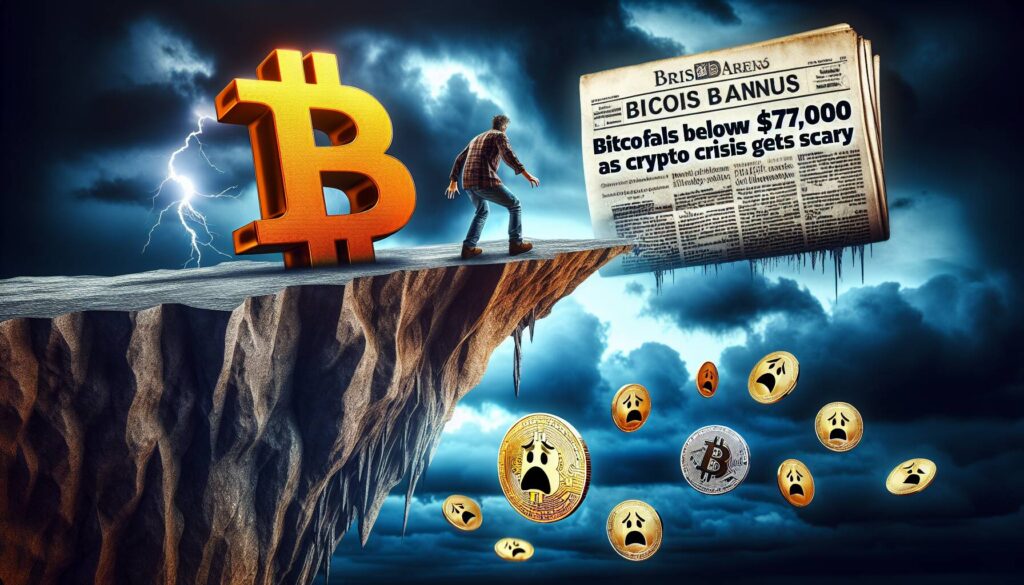In a surprising announcement at JPMorgan Chase’s recent annual Investor Day, CEO Jamie Dimon revealed that clients of the banking giant will soon have the opportunity to purchase bitcoin (BTC). This move indicates a notable shift in JPMorgan’s stance toward cryptocurrency, a domain Dimon has often approached with skepticism. “We are going to allow you to buy it,” he confirmed to shareholders, although he emphasized that the bank will not be offering custodial services for the asset.
Despite this new offering, Dimon’s long-standing criticism of bitcoin remains intact. He reaffirmed his position as “not a fan” of the digital currency, citing concerns over its association with illegal activities such as money laundering and sex trafficking. These comments reflect a cautious perspective on cryptocurrencies, which are often regarded as volatile and risky investments.
“We have been talking about blockchain for 12 to 15 years,” Dimon remarked during the event. “We spend too much on it. It doesn’t matter as much as you all think.”
Interestingly, while Dimon downplays the significance of blockchain technology, JPMorgan continues to invest in this area. The firm’s blockchain platform, Kinexys, recently made headlines by successfully conducting its first test transaction on a public blockchain, settling tokenized U.S. Treasuries on the Ondo Chain’s testnet. This development showcases JPMorgan’s ongoing commitment to exploring the potential of blockchain, even as its CEO questions its overall importance.
As JPMorgan aligns its services to meet the demands of clients interested in cryptocurrencies, this latest development comes at a time when the broader industry continues to gain traction. While concerns linger around the implications of cryptocurrencies, the banking powerhouse’s shift reflects an evolving landscape where traditional institutions are increasingly engaging with digital assets.

JPMorgan Chase’s Shift Towards Bitcoin and Blockchain
Recent comments from CEO Jamie Dimon at JPMorgan Chase’s annual Investor Day highlight significant transitions in the bank’s stance towards cryptocurrencies and blockchain technology. Here are the key points from his remarks:
- Clients Can Buy Bitcoin:
- JPMorgan Chase will allow clients to purchase bitcoin (BTC), marking a notable shift in the bank’s strategy.
- No Custody of Bitcoin:
- The bank intends to facilitate bitcoin purchases but has no plans to hold the asset in custody, potentially limiting client investment options.
- Continued Skepticism:
- Despite the announcement, Dimon reiterated his skepticism towards bitcoin, primarily due to its association with illegal activities.
- His stance may influence public perception, particularly among investors who follow the bank’s guidance.
- Blockchain Technology Hype:
- Dimon expressed doubt regarding the importance of blockchain technology, suggesting that it may not be as transformative as many proponents claim.
- This skepticism contrasts with JPMorgan’s ongoing investments in blockchain, indicating a complex relationship with the technology.
- Testing Blockchain Applications:
- The bank’s Kinexys platform recently completed a test transaction using a public blockchain, showcasing efforts in exploring blockchain applications for financial services.
This shift in policy and attitude by a major financial institution like JPMorgan Chase could directly impact clients’ investment choices, while also reflecting broader trends and challenges within the cryptocurrency market.
JPMorgan Chase’s Bitcoin Offering: A Shift in Perspective
JPMorgan Chase’s recent announcement regarding the option for clients to purchase bitcoin signifies a notable shift for one of the largest financial institutions historically skeptical of cryptocurrencies. CEO Jamie Dimon, typically vocal about his apprehensions surrounding digital currencies, has revealed an intriguing dance between embracing customer demand while holding onto a cautious stance regarding the risks associated with bitcoin. This pivot highlights JPMorgan’s competitive position in the evolving landscape of cryptocurrency and traditional finance.
One significant advantage of this move is that it places JPMorgan at the forefront of a growing trend among banks to offer digital asset services. Unlike many competitors who are fully integrating cryptocurrency into their operations, JPMorgan is taking a more measured approach. The bank’s decision not to hold bitcoin in custody could resonate with clients who prefer a form of exposure without the perceived risks of direct ownership. However, by refraining from offering custodial services, JPMorgan may inadvertently drive crypto-savvy clients toward rivals who provide more comprehensive services, like custody and wallet management.
Despite Dimon’s continued skepticism about bitcoin’s role in illegal activities and his critical view of blockchain hype, the bank’s foray into bitcoin trading is an essential signal to investors. It suggests that even cautious traditional banks recognize the increasing acceptance and curiosity surrounding cryptocurrencies. This could benefit institutional investors looking for legitimacy in their digital asset acquisitions, but it may also create tension with traditionalists who view bitcoin solely as a speculative tool.
However, there are risks inherent in JPMorgan’s duality. While some may see the bank’s resistance to fully embracing cryptocurrencies as a protective stance, it may alienate younger, tech-oriented clients who are seeking more dynamic engagement with digital assets. As competition heats up in the financial services sector, banks that ignore the full spectrum of cryptocurrency applications may encounter challenges in retention and attraction of new customers, especially those prioritizing innovation and agility in financial services.
In summary, JPMorgan Chase’s approach could benefit both cautious investors and crypto enthusiasts who need a bank that offers a blend of traditional services with a nod to modern assets. Conversely, it may pose challenges for those seeking a more comprehensive digital asset experience, potentially leading them to explore options with other financial institutions more fully invested in the cryptocurrency ecosystem.

















